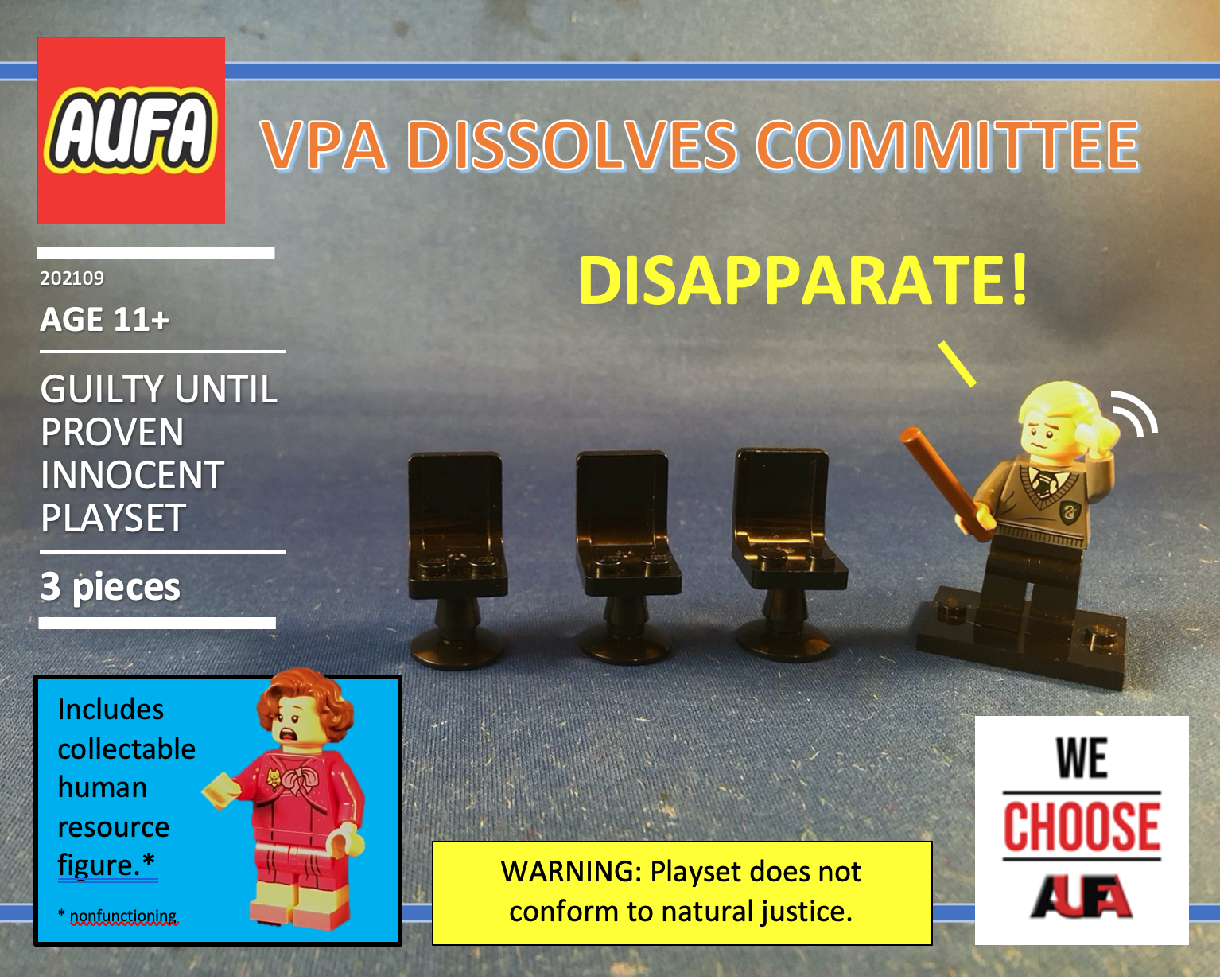Promotion committee dissolution
For the past year, AUFA has been working with three members of a promotion committee who were mistreated by AU. This blog post details the events in question with the aim of clearing these AUFA members’ reputations.
Background
Promotion committees are established pursuant to Article 3.6 of the collective agreement. When a professor applies for promotion, the Vice-President Academic (VPA) appoints a three-person committee to review and make a recommendation about whether or not promotion is warranted. Promotion committee work is generally viewed as confidential, with the candidate for promotion being informed only of the final outcome.
In 2020, a promotion committee was established and began reviewing an application. In the summer of 2020, an allegation was made that a member of the promotion committee had disclosed confidential information. The VPA and the relevant dean met with the committee and announced there had been a breach of confidentiality.
The VPA then told the members that the committee was being disestablished and an investigation into the alleged disclosure would take place (presumably conducted by Human Resources). The VPA also announced at the meeting that a new committee would be formed. The committee members responded that they would fully support a thorough investigation to find what happened and if there was any breach at all.
The committee members were told the substance of the disclosure was that the committee was not going to recommend promotion. This was, in fact, not the committee’s recommendation. That the alleged leak was factually incorrect would suggest that the source of the leak was not a member of the committee. The committee was not informed who was accused of leaking the information.
AU did not commence a disciplinary investigation under Article 7 of the collective agreement. Whatever investigation AU conducted did not include interviewing any of the committee members about the matter. In late November of 2020, HR told the committee members that there was a “perception” that the confidentiality of committee had been breached and a new promotion committee would be struck. This echoed what the VPA had announced earlier when he had met with the committee members to inform his decision.
The members of the promotion committee told HR that they were concerned that their colleagues would infer they had committed some wrongdoing because the committee they had been serving on had been disbanded without explanation. They were concerned that this inference would negatively affect their reputations. They requested AU take action that would protect reputations. They again requested a thorough investigation into the matter. The HR representatives said they would need to consult their supervisors about this request. Ultimately, HR neither responded to this request nor took any action to protect the committee members’ reputations.
Analysis
The VPA’s decision to disband the committee and the subsequent investigation are problematic in five ways.
Article 3.6 of the collective agreement gives the VPA the authority to establish a promotion committee. Article 3.6 does not give the VPA the authority to dis-establish the committee. AUFA has informed AU that, if the VPA wishes this authority, AU can either bargain this into the collective agreement or the VPA can seek the agreement of AUFA on a case-by-case basis. In this case, AUFA views the VPA to have violate the collective agreement.
Sitting on promotion committees is a right conferred upon some AUFA members by Article 3.6. Article 7.5 identifies that denying members collective agreement rights is a form of discipline. Article 7.1 says that no member shall be subject to disciplinary action except in accordance with the procedures outlined in Article 7. Summarily dismissing members from a promotion committee constitutes a denial of rights. The VPA’s imposition of this denial without completing the investigation process required by Article 7 is a violation of the collective agreement.
The VPA’s dissolution of the committee before any meaningful investigation of the allegation had been undertaken shows a profound disregard for procedural justice. Essentially, the committee members were treated as guilty until proven innocent. Even a cursory review of the facts readily available to the VPA (the alleged leak and the committee’s actual recommendation) would have demonstrated that the alleged leak was factually incorrect. This, in turn, strongly suggests that the committee members were not the source of the leak. Surely, if a committee member was going to leak the outcome of a decision, the leak would be factually correct.
Whatever investigation AU undertook was inconsistent with the principles of natural justice. Natural justice includes the right of the accused to know the case against them and make a response before a conclusion about alleged wrongdoing is reached. The former committee members were never interviewed or given a meaningful opportunity to respond to whatever allegations were made or the evidence (if any) that implicated them.
Disbanding a committee this way casts a cloud over the reputations of the former committee members. Their colleagues will be aware that the committee that they were on was disbanded and that they are not on the new promotion committee. For this reason, AU’s unwillingness to clear the committee members’ names continues to work a hardship upon these members. Like many other AUFA members, these three members have always been sincere, doing their best to advance the academic standards and reputation of this institution. The decisions made by the VPA and the subsequent inaction are likely to demotivate and demoralize sincere AUFA members.
Efforts by AUFA and the committee members to resolve this matter have been unsuccessful. Rather than grieving this (which would not provide a meaningful remedy at this point), the members decided simply to share their experience in the hope that their colleagues who may have questions about their integrity will find this explanation satisfactory.
Other AUFA members with concerns about interference with the operation of promotion or tenure committees are encouraged to contact AUFA’s executive director, Richard Roach (roachr@aufa.ca).
Bob Barnetson, member
AUFA grievance committee

